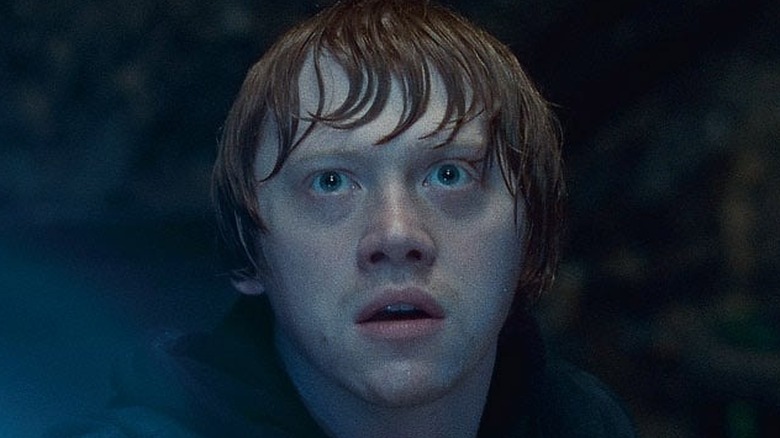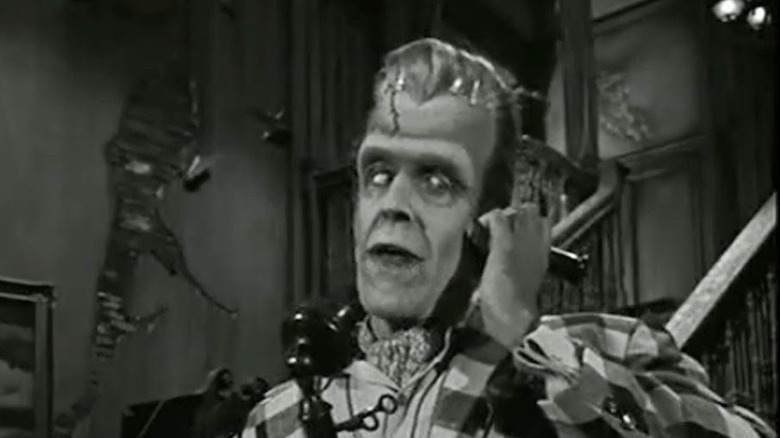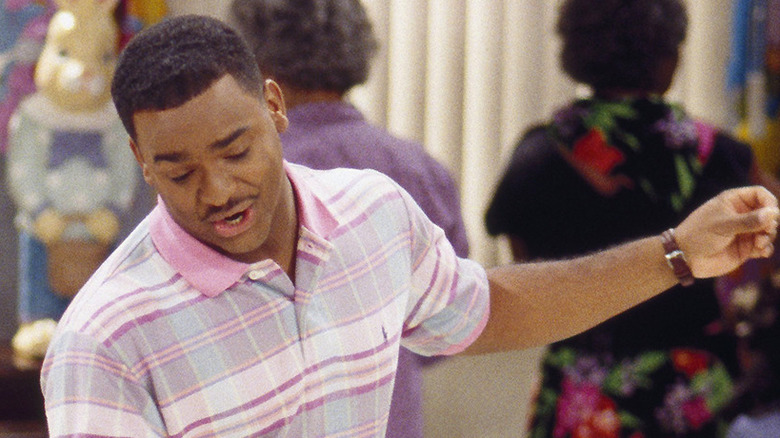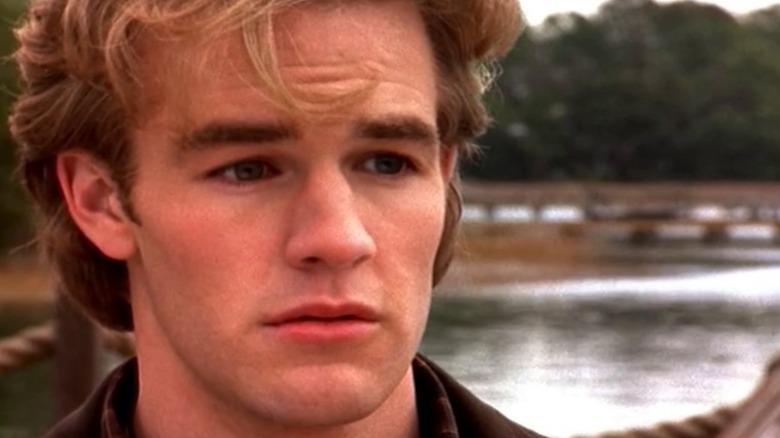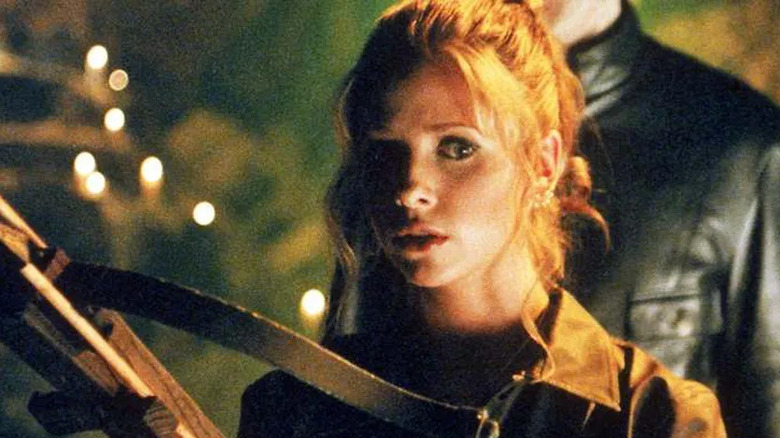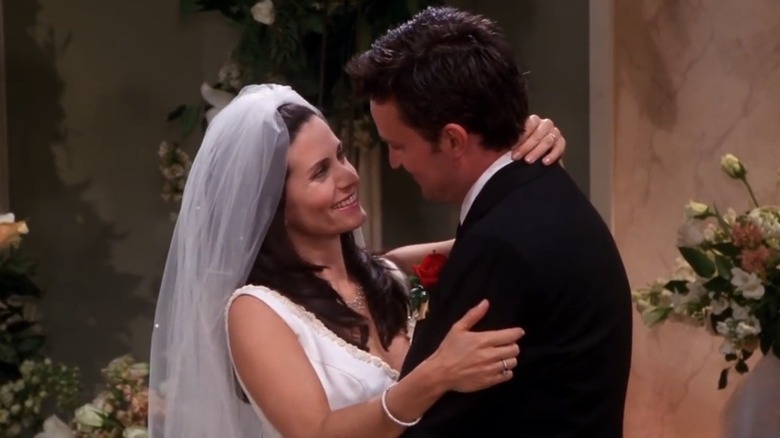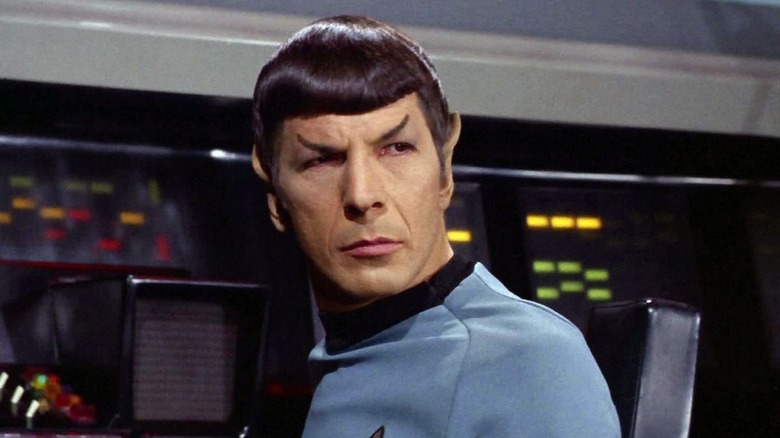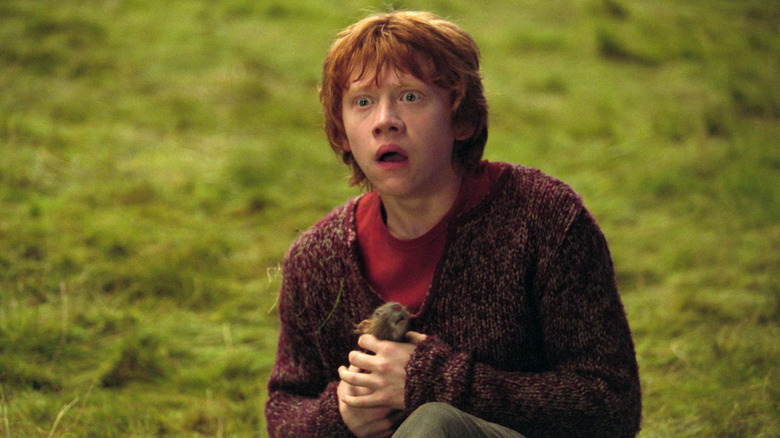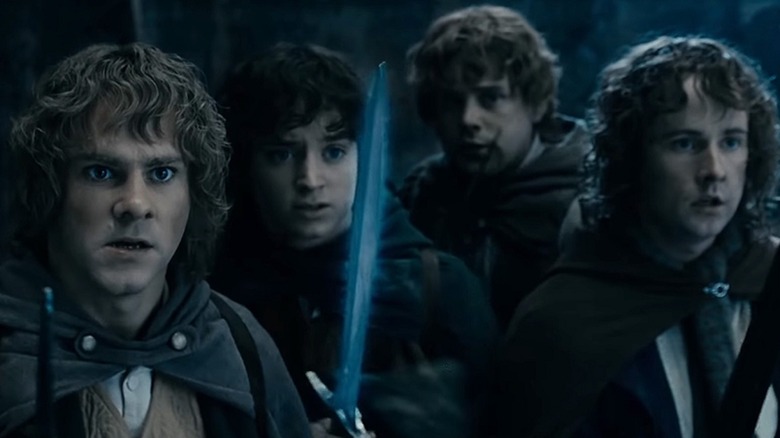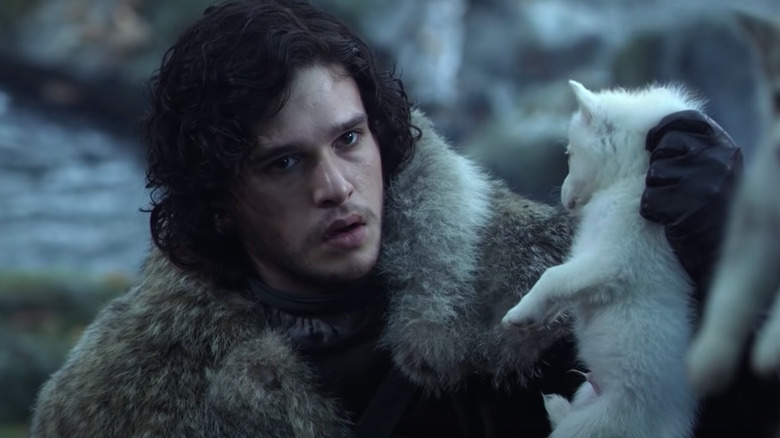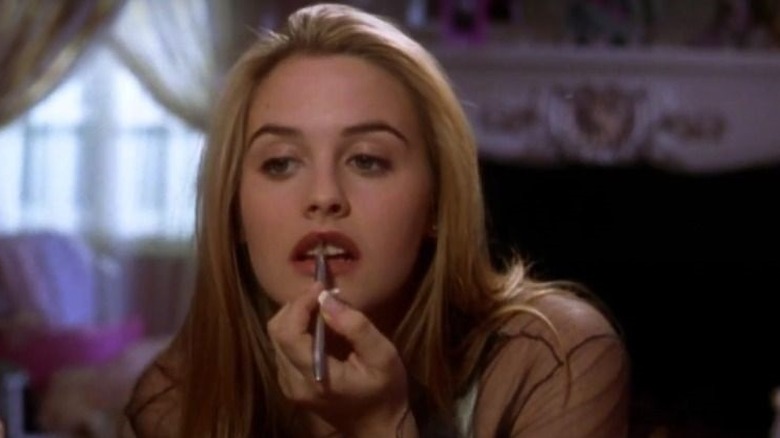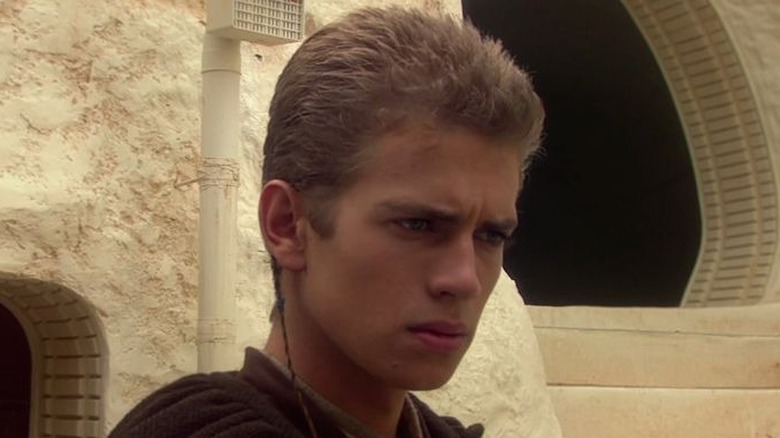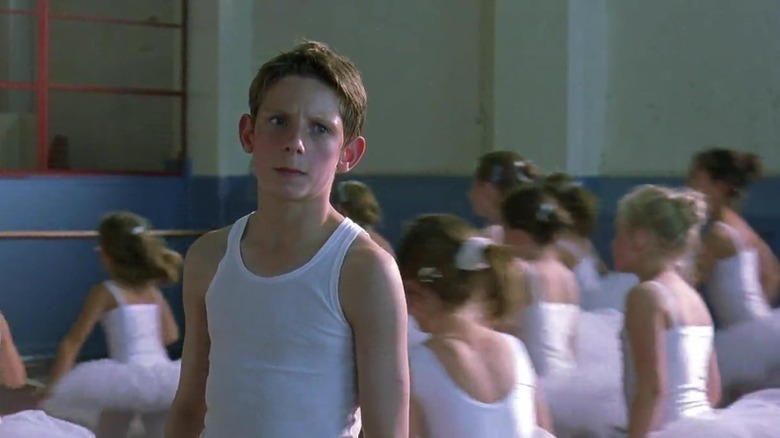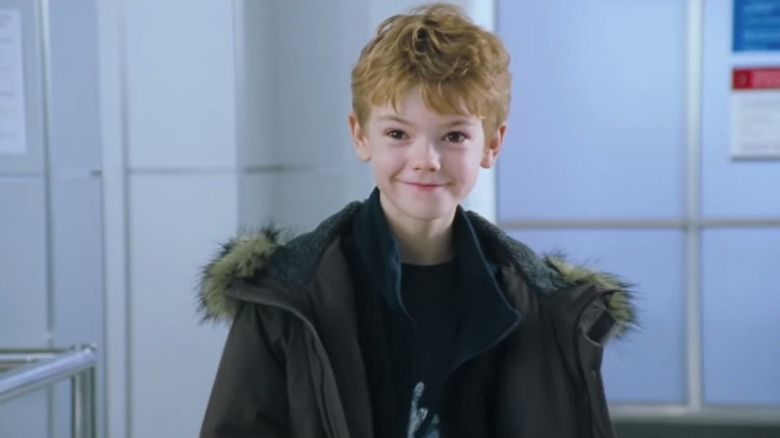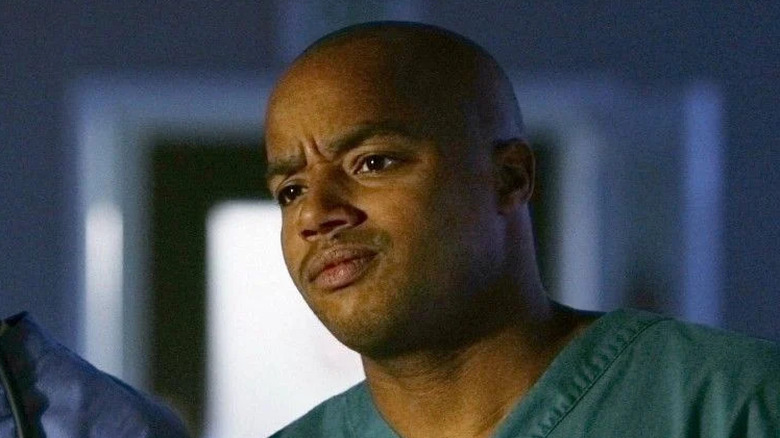Roles That Made An Actor Famous But Then Completely Ruined Them
The Hollywood success stories we usually hear go something like this: Actor breaks out with major hit, actor goes on to another major hit, and another, etc. Cut to 50 years later, and that actor is happily planting their hands in the concrete outside Grauman's Chinese Theatre, surrounded by adoring fans. The end.
In reality, not every role that makes an actor famous leads to a lasting career. Sometimes, getting famous in one particular part means that people can't ever see you as something else. When that job is over, you struggle to find another one. And sometimes, it makes you realize that the intense pressure that comes with being that famous just isn't for you at all.
Despite our Dickensian title, most actors don't end up "completely ruined" — thankfully. But when you think you've finally got your name up on billboards and buses, only to be reduced to taking half-rate movies and swiftly-canceled TV series, it probably feels close to that. From sitcom stars to franchise leads, here are the actors whose most famous role derailed their careers.
Playing Herman Munster made Fred Gwynne too recognizable
Fred Gwynne's most famous role wasn't even his most commercially successful, but it nearly stopped him from working again. In 1963, Gwynne's buddy sitcom "Car 54, Where Are You?" (about two hapless NYPD officers) was canceled by NBC. The following year, he was cast as warm-hearted Frankenstein's monster and family patriarch Herman Munster in CBS' "The Munsters." Already 6' 5", Gwynne added five-inch-high boots for the role. The show was canceled after just two seasons but became a cult hit.
Suddenly no one could look at Gwynne without seeing Herman — including casting directors. In 1978, Gwynne told The New York Times that he struggled emotionally after the show ended. He'd invested his modest salary in a little company called Xerox that took off, so for the first time he could afford to only do projects he liked. But in the shadow of Herman, he couldn't find anything that fit him, and no one else could either.
Fortunately for Gwynne, there was one place where no one cared about a sitcom: the theater. He started doing Shakespeare plays in Stratford (Connecticut, not Upon-Avon) and built a stage career. He also wrote children's books, did voiceover work, and had small parts in movies including "Fatal Attraction" and "My Cousin Vinny." He didn't begrudge Herman for sidelining him: In 1981, Gwynne reprised the role for TV movie "Munster's Revenge."
Playing Carlton forced Alfonso Ribeiro to make himself a character
Alfonso Ribeiro was an industry veteran when at 19 he was offered the role of Carlton Banks, nerdy cousin to Will (Will Smith) in "The Fresh Prince of Bel-Air." He even turned down a show that was already a hit: "The Cosby Show" spin-off "A Different World." Prior to playing Carlton, Ribeiro's most famous role had been Alfonso Spears in sitcom "Silver Spoons."
Unlike Carlton, Spears was somewhat stereotyped as the "cool" Black best friend of the white main character. With his love of garish sweaters, condescending manner and dad dance moves, Carlton was the opposite of cool. But he was also oddly endearing, largely thanks to Ribeiro's performance. When "The Fresh Prince" ended in 1996, after six seasons, Ribeiro joined another sitcom, "In the House," which co-starred LL Cool J and Kim Wayans. Even that had a "Fresh Prince" tie: Before becoming a cast member, Ribeiro had appeared as Carlton for an episode.
Ribeiro has come to reluctantly accept that he will probably always be seen as lovably dorky Carlton. In 2017, he told Metro that when he couldn't get hired to play a character, he had to become a TV personality. In 2014, he broke out his dance moves again to win "Dancing With the Stars," and regularly works as a TV host, currently of "America's Funniest Home Videos." He told Metro that playing Carlton, "was rewarding in many ways, and also least rewarding in many ways."
James Van Der Beek found Dawson dull
Sweet-natured, floppy-haired, daydreamy Dawson Leery won legions of fans in the early '00s. But the actor who played him, James Van Der Beek, wasn't one of them — especially since the role followed him around long after the show ended in 2003.
In an interview with Buzzfeed in 2014, Van Der Beek said that he never doubted that he could play darker, more complicated roles, but that his association with Dawson prevented other people casting him in them. "It did hold me back," he admitted, adding, "But at the end of the day, it just makes you work that much harder."
Van Der Beek has accepted the situation enough to make a joke of it. He briefly joined another teen drama, "One Tree Hill," as an eccentric director, a nod to Dawson's chosen career. And he played a satirical version of himself in "Don't Trust the B**** in Apartment 23." He's also occasionally had the chance to play more serious characters, notably in drama "Labor Day" and in FX's "Pose."
Given the choice, Van Der Beek may have preferred to make a name in the industry in a different way. But he has worked consistently since "Dawson's Creek" ended, including in some meaty projects. He just had to put some years between himself and his dreamy teenage character.
Sarah Michelle Gellar never had another hit like Buffy
Sarah Michelle Gellar played one of the most beloved TV characters of all time — and then all but disappeared. For those who slept through 1997 and 2003, Gellar starred in "Buffy the Vampire Slayer" as the super-powered eponymous killer of all (well, some) things supernatural. The show transcended its geeky horror routes to become a sexy teenage drama and girl power manifesto. Gellar definitely wasn't asleep: As the main character of a show with 22 hour-long episodes in most seasons, she worked very long hours. Even for a former child, it was intense.
Gellar had a couple of notable movie roles during "Buffy," namely "Cruel Intentions" and the live action version of "Scooby Doo." After the show, she starred in a remake of Japanese horror movie "The Grudge." But since then, she's mostly stuck to voice work on shows including "Robot Chicken" (co-created by "Buffy" alumnus Seth Green) and "Star Wars Rebels."
Although playing such a famous character was no doubt pigeonholing, it may have been the "Buffy" set that scarred Gellar. It's long been rumored that she and Alyson Hannigan (who played her onscreen best friend) didn't get on. And when "Buffy" and "Angel" actor Charisma Carpenter accused show creator Joss Whedon of abuse, Gellar tweeted her support for Carpenter. In 2021, with a "Buffy" reboot in the works, Gellar told "On With Mario Lopez" that she's "way too tired and cranky to put in that kind of work again."
These Friends actors didn't get on so well after the show
One of the reasons fans loved "Friends" was because the six lead actors made their characters feel like real people. This turned out to be a double-edged sword when the show ended, since no one could picture them playing anybody else.
Three of the main cast managed to escape this trap to different extents. Jennifer Aniston went on to a successful movie career, blending rom-coms with the occasional heavier piece (the tabloids' shared obsession over her love life may have helped set her apart from her character). Meanwhile, Lisa Kudrow became the lead of short-lived, Emmy-nominated critical darling "The Comeback," and pops up in movies. And after wisely giving up on spin-off "Joey," Matt LeBlanc won a Golden Globe playing a version of himself in quirky TV comedy "Episodes." He also briefly presented car show "Top Gear."
However, the other three cast members struggled to move forward in their careers. Having made a few movies during "Friends," Matthew Perry took some time off to recover from a drug and alcohol addiction. Courteney Cox starred in six seasons of the forgettable drama "Cougar Town." David Schwimmer voiced a giraffe in the hit animated movie series "Madagascar," but couldn't shake Ross — at least until he pulled off a convincing Robert Kardashian in "American Crime Story."
Simply put, after "Friends," none of the show's stars had to work again. And sometimes they couldn't.
If you or anyone you know is struggling with addiction issues, help is available. Visit the Substance Abuse and Mental Health Services Administration website or contact SAMHSA's National Helpline at 1-800-662-HELP (4357).
Spock lived long for Leonard Nimoy
Leonard Nimoy was so associated with his most famous character that he titled his 1975 memoir "I Am Not Spock." He'd played the half-Vulcan/half-human for three seasons of a not-even-popular show, which had first aired in 1966. "Star Trek" only became the cult classic it is today after that first iteration of the show went into syndication.
Nimoy's co-star William Shatner was able to use his "Star Trek" character Captain James T. Kirk to forge a persona for himself as a charming, dashing hero. But Nimoy initially felt typecast as the methodical, stoic Spock. Whereas Kirk is just another swashbuckler, in space or wherever, there were fewer opportunities for the kind of calm wisdom Nimoy was identified with.
Eventually, Nimoy learned to accept his Spock status. He appreciated that he was always able to find work, even if it was within a narrow spectrum, and pursued his passions on the side of his acting work. He directed, took photos, and wrote poetry. Nimoy returned to Spock multiple times, in new series and movies, and appeared at conventions. And two decades after that first memoir, he followed it up with another: "I Am Spock."
Rupert Grint pulled a disappearing act after Harry Potter
You shouldn't need a crystal ball to predict that playing one very famous character for 10 years in a series of extremely popular movies could lead to typecasting. However, of the three actors who played the main trio in "Harry Potter," Rupert Grint has struggled the most with his post-Potter career.
You might have bet that Daniel Radcliffe, who played and looked like Harry Potter for so long, would have been set back the most. But rather than fight the comparisons, Radcliffe accepted that he would always be best known for "Potter," and used his fame to get projects made that he liked. In doing so, he became an indie superstar as well as the face of a blockbuster series.
Meanwhile, Emma Watson leaned into Hermione's nerdy image, using her "Harry Potter" fortune to study at Brown University. She's now almost as famous for her UN activism and modeling campaigns as for her movies.
But Rupert Grint — whose comic timing had made him a critical favorite of the three — hasn't found a clear footing since "Harry Potter." He appeared in a few British series, including 2006's "Driving Lessons," alongside his "Harry Potter" mum Julie Walters. And more recently, he's starred in M. Night Shyamalan-produced horror series "Servant." However, Grint has said that working on "Harry Potter" made him realize that while he liked acting for fun as a kid, there are other things he'd rather do for work (via MyLondon).
These Lord of the Rings actors were trapped by the Shire
"Lord of the Rings" transported its audiences to a whole new world, and when the epic fantasy trilogy was over, some of its stars got left behind. The four actors who played the main hobbits will forever be grounded on Middle Earth, to greater or lesser degrees.
Ironically the one whose career has been least hampered is the actor whose face was on the posters. Elijah Wood played ring-bearer Frodo in the trilogy. His first post-"LOTR" role was as a creepy memory-eraser in "Eternal Sunshine of the Spotless Mind," followed by a drama about football hooliganism, and then playing a cannibalistic serial killer in "Sin City." Wood will always be recognized as Frodo: but he did a good job of escaping typecasting.
The other three haven't strayed as far from their hobbit past. Sean Astin even made a commercial for British phone company Orange about being typecast. He's worked steadily since "LOTR," especially in voiceover work, and had a notable role in "Stranger Things." But after early iconic roles, his career was never as prominent after "LOTR."
Dominic Monaghan, who played Merry, added a second beloved character to his resume as Charlie on "Lost," then slipped into obscurity. In 2021, he teamed up with Billy Boyd — aka Pippin — for a podcast, The Friendship Onion, in which they discuss working on "LOTR" and other projects. If you can't outrun it, you might as well embrace it.
Kit Harington found it difficult to say goodbye to Jon Snow
While fans have been very clear about their feelings towards the ending of "Game of Thrones" (sad or angry or both), Kit Harington, who played beloved character, Jon Snow, had mixed feelings.
In an interview with Variety published shortly before the series finale aired, Harington said that taking off his costume on the last day of shooting "felt like my skin was being peeled away. I was very emotional." He'd also previously described the working conditions on the final season as extremely difficult, telling GQ, "Everyone was broken at the end." Before the episode made it to screen, Harington secretly checked himself into rehab for help with alcohol abuse and mental health issues. He later admitted to SiriusXM's "The Jess Cagle Show" that it was absolutely the right decision, and "it was directly to do with the nature of the show."
After his experience with "GoT," Harington appears to have come out the other side. In 2021, he played a significant part in Marvel's "Eternals." How significant remains to be seen, but Jon Snow might finally be laid to rest.
If you or anyone you know is struggling with addiction issues, help is available. Visit the Substance Abuse and Mental Health Services Administration website or contact SAMHSA's National Helpline at 1-800-662-HELP (4357).
Alicia Silverstone didn't fit in
Alicia Silverstone played the ultimate Beverly Hills brat Cher Horowitz in 1995's coming-of-age comedy "Clueless." The movie was an instant unexpected hit, and Silverstone was widely assumed to be the next superstarlet. However, the next project she signed on to was "Batman & Robin," starring George Clooney. Today, a superhero movie is a logical career move for an actor on their way up. But back then, the movie bombed, and Silverstone was harshly criticized.
In contrast to the character that made her famous, Silverstone has said that she wasn't particularly good at the popularity contests Hollywood demands. She told The Guardian, "I stopped loving acting for a very long time."
Ultimately, the pressure that came with becoming a household name overnight — especially while still a teenager — was too much for Silverstone. It ruined her chance at a career built on a more sustainable slow and steady climb up the ladder (like, say, "Clueless" co-star Paul Rudd.) But it also opened her eyes very quickly to the less-than-glamorous realities. Silverstone decided to focus on theater and independent projects. "I really love those weird movies," she told The Guardian.
Star Wars made Hayden Christensen want to retire
It's hard to remember now, but in 1999, the only three "Star Wars" movies that had ever come out had all been enormous critical and commercial hits. There was no reason to doubt that the highly anticipated prequel trilogy would be any different. If you just hone in on the money, the response was similar. The three movies did well at the box office and spawned the usual toy lines. The problem was that people didn't like them, and being "Star Wars" fans, they were very vocal about that dislike.
The person who bore the brunt of the vitriol was Hayden Christensen, the 19-year-old Canadian who had been recruited from a 1,500-strong casting call to play pre-Darth Vader Anakin Skywalker. Christensen had had a few notable roles, including in Sofia Coppola's "The Virgin Suicides," and had even been nominated for a Golden Globe. Despite these credentials, Christensen's "Star Wars" performances were dismissed as wooden and unbelievable. That would be bad enough on a small movie, but this came from millions of people.
He made the obvious choice: He became a farmer in Toronto, occasionally taking acting roles in small movies. However, Christensen wasn't entirely done with the movie franchise that made and then ruined his career. He's returning alongside Ewan MacGregor (Obi-Wan from the prequels) for Disney+ series "Obi-Wan Kenobi." No one can resist the power of the Force forever.
Jamie Bell's moment in the spotlight didn't last
Most of us probably wouldn't want to be defined by something we did at 14. At that age, Jamie Bell was chosen from 2,000 actors for the lead role in "Billy Elliot." He played a teenage boy in impoverished 1980s Northern England, who discovers a talent for and love of ballet-dancing — much to his father's initial horror. The role earned Bell a BAFTA (a British Oscar) and the movie picked up three Academy Award nominations. It also became a very successful stage musical. Bell is still grateful for "Billy Elliot," as he told the Guardian in 2011. However, the promising start didn't generate the kinds of leading man roles you might expect.
In 2002 Bell had a supporting role in "Nicholas Nickleby," billed below future "Sons of Anarchy" star Charlie Hunnam. In 2008, he had another supporting role in the much-maligned "Jumper," which starred Hayden Christensen.
Even a Steven Spielberg movie — "The Adventures of Tintin" — and a 2015 superhero movie — "Fantastic Four" —- weren't enough to get him to the next level. After such high expectations early on, Bell ultimately couldn't stick the landing.
Thomas Brodie-Sangster spent years as That Kid in Love Actually
If you don't recognize Thomas Brodie-Sangster's name, knowing that his most famous character is called Sam probably won't help. But if we tell you he's "That Kid in Love Actually," fans of the movie will instantly recall his messy blonde hair, drumming skills, and solemn declarations of love.
Brodie-Sangster was only 13 when "Love Actually" came out. The movie served to cement him as the go-to sweet young kid, an image he's been stuck with ever since. On the bright side, it landed him roles in "Doctor Who" and "The Maze Runner," but the prevalence of "Love Actually" (plus his naturally young-looking face), have made it hard for anyone to see him as a leading man. At 24, he was playing 13-year-old Jojen Reed in "Game of Thrones."
Now over 30, Brodie-Sangster has finally been landing more adult roles. He played a grown-up love interest in hit Netflix drama "The Queen's Gambit." Too bad there's no season two.
Donald Faison knows you call him Turk From Scrubs
Donald Faison was already "the guy from 'Clueless'" when he was cast as surgeon Dr. Christopher Turk in "Scrubs" (via GQ). The show was completely unlike contemporary medical dramas like "E.R.," thanks to the musical numbers, quirky daydream sequences, and characters that were one step shy of caricatures, which interspersed with intense moments of life and death.
When "Scrubs" ended after nine seasons in 2010, Faison found that far from opening the kinds of doors you'd expect from a highly rated sit-com, his association with the show prevented him from getting work. In 2019, he recalled to CinemaBlend walking out of an audition and worrying, "I think they saw Turk from 'Scrubs.'"
In 2020, Faison and onscreen (and real-life) best friend Zach Braff leaned into their greatest hit, creating the podcast Fake Doctors, Real Friends. As Braff noted to GQ, "no matter what Donald and I do ... we're always going to be known for 'Scrubs.'"
